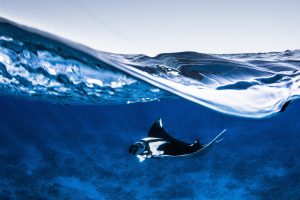Rebreather diver Luiz Rocha, who reaches depths as great as 150m to study little-known coral reefs, has been elected to the 2024 class of the prestigious Explorers Club 50, described as “Fifty People Changing the World that the World Needs to Know About”.
The EC50 recognises those who are “doing remarkable work to promote science and exploration”. The annual programme was conceived in 2020 on the idea that many of the greatest contributions to modern exploration come from all corners of science, art and culture that are not always sufficiently recognised.
Brazilian-born Rocha, who is ichthyology chair at the California Academy of Sciences, has spent more than 6,000 hours studying coral reef fish under water, and is widely published. He is also co-director of the academy’s Hope For Reefs initiative.
His current explorations cover reefs in the Twilight Zone between 60 and 150m, and he advocates for the protection of the fauna he discovers and describes. He has recently co-authored a cover story for Nature, highlighting the extent of plastic pollution on coral reefs, and contributed to a comprehensive field guide to Brazilian reef fish.
‘Severe consequences’
“Diving to the depths that I do requires a lot of training, preparation and the right mindset,” says Rocha. “The risks are high, and small mistakes can have severe consequences.
“Logistics involved are very complex, a lot of equipment needs to be moved, and consumables (for example the helium we have to breathe at those depths) are hard to find, especially in remote locations – which invariably are the most interesting.
“In addition, because of the risks and high costs, funding through traditional scientific granting agencies is almost impossible to get. All of that makes deep reef exploration by scientists very rare; I estimate that there are no more than 10 scientists diving to the same depths that my team and I dive worldwide.
“The ecosystem is so unknown that we find new species of fish on almost every dive, and when we start sampling other groups of animals, the number of undiscovered species will grow to the hundreds.
“So that is how I am pushing the boundaries, taking scientific exploration through technical diving deeper than ever before, and training more scientists to do it.”
Since its inception in 1904, Explorers Club members have included the first humans to reach both poles, Mt Everest’s summit, the deepest point in the ocean and the Moon.
“Our focus is to nurture the next generation of explorers and we are dedicated to creating an environment that fosters curiosity, boldness and innovation,” says Explorers Club president emeritus Richard Wiese of EC50.
“The torch of exploration we pass on is a symbol of hope and guidance for those destined to redefine the known boundaries of our world.”
Also read: Rannva Jørmundsson accepted as member of The Explorers Club, Nick Lyon awarded Fellowship of The Explorers Club


